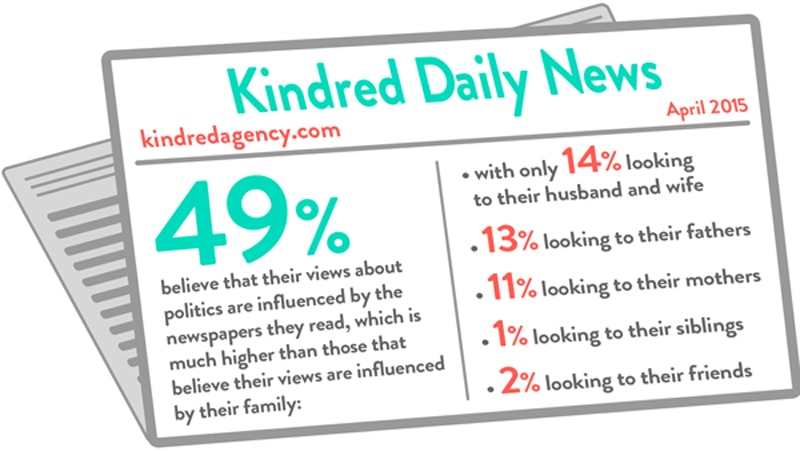Political parties need to continue to embrace the mainstream, it’s when they get into power that digital becomes the channel of choice, writes Anastasia Scott, Managing Partner, Kindred.
With the general election imminent, we have watched each political party mobilise themselves ready to end their long campaigns with a sprint finish.
As Robert Cookson writes, we have watched each party ‘weaponise digital media’ for their respective campaigns – Ed Miliband is interviewed by Russell Brand for his ‘Trews’ YouTube show, leaked invoices show the impressive amount spent on Facebook advertising by the Conservatives, the Green Party posted a music video on YouTube and the list goes on.
There has been a definite push towards social and digital strategies in this year’s election, but what place does this leave for traditional PR tactics?
We live in age where we value recommendations from our friends and family extremely highly – and social media is the perfect vehicle for these recommendations to circulate. Studies show that personal recommendation is one of the most powerful influencers on consumer choices; however, in a recent survey commissioned through Censuswide, Kindred found that though Brits value these opinions of friends and family extremely highly in some areas, such as career advice, education, health, food, business, and travel there appears to be one glaring omission on the list, and that is politics.
 Research from our Kindred 100 panel, a representative selection of Brits from all over the United Kingdom, across a variety of ages, regions and backgrounds, proves that it is other, more traditional media that holds the most influence over voting behaviour.
Research from our Kindred 100 panel, a representative selection of Brits from all over the United Kingdom, across a variety of ages, regions and backgrounds, proves that it is other, more traditional media that holds the most influence over voting behaviour.
81% of our Kindred 100 access information on politics through television, whilst 63% say print newspapers are their go-to resource. These statistics vastly overshadow those that turn to Facebook, Twitter and YouTube at just 22%, 13% and 5% respectively.
 Our survey also shows that 49% admit their views on politics are influenced by the newspaper they read. This is in stark contrast to the number of people who say they are influenced by their husband of wife (14%), father (13%), mother (11%), friends (2%), or siblings (1%).
Our survey also shows that 49% admit their views on politics are influenced by the newspaper they read. This is in stark contrast to the number of people who say they are influenced by their husband of wife (14%), father (13%), mother (11%), friends (2%), or siblings (1%).
The traditional PR functions of the major political parties are still as important as ever, and shouldn’t be overlooked just because the digital world often steals the limelight. In the closing days of the election, we should expect each party to be persistent through traditional media, trying to steal headline stories across newspapers and television.
However, this all changes once elected politicians takes up residence in their constituencies or at Number 10. The Kindred 100 research has also revealed that the voting public would prefer to communicate digitally with their local representatives via social media (35%) and email (49%) making it all the more important for the new Government to make better use of their digital channels in order to keep a dialogue open post-election. Until then, I’ll be perusing the pages of the broadsheets and tabloids and getting ready to spend next Thursday night with a certain Mr Dimbleby – just like the majority of those casting their vote.
If you enjoyed this article, sign up for free to our twice weekly editorial alert.
We have six email alerts in total - covering ESG, internal comms, PR jobs and events. Enter your email address below to find out more:



